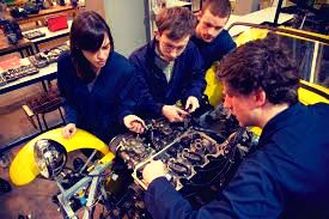 The Bachelor of Science in Mechanical Engineering (BSME) is a college program leading to a degree in one of the most diverse engineering disciplines which deals with the design, development, installation, operation and maintenance of anything that has moving parts such as machineries, engines, and structures used in industrial, biomedical, instrumentation and transportation systems. The course also includes the study of conversion of thermal and chemical energy into mechanical work through engines and power plants and how to utilize these energies, forces and structures to perform a variety of tasks. The BSME curriculum is composed of CHED-mandated general educations courses, technical courses, fundamental engineering courses, professional mechanical courses, elective courses, and on-the-Job training or plant visitation. Most subjects are taught through classroom discussions with laboratory exercises and group projects. During the Practicum, theoretical knowledge is put into practice. Mechanical Engineering graduates can pursue careers in manufacturing firms, automotive companies, power generation and utility plants. Since all manufactured products contain parts that transmit forces, mechanical engineering is considered vital in designing and selecting materials that will ensure the structural integrity of almost every product. Recently, several schools offer the ladderized BSME program which now provides better career opportunities for students, even to those who may not be able to finish the full course. Technical-Vocational education trainings (TVET) are embedded in the enriched ladderized curriculum and students will be awarded TESDA certifications for acquired competencies at certain levels. Example: PC Operation Certificate after the first year; Welding Certificate, after the second year; then the Certificate in Automotive Body Repairing after the third year. The remaining two years will be devoted to major courses leading to the award of a BSME degree. Is Mechanical Engineering a profession? Mechanical Engineering is a profession. A graduate of BS in Mechanical Engineering who passed the Mechanical Engineering Licensure Examination is called a Mechanical Engineer. What are the admission requirements for BSME? Requirements at each school may differ, but these are the common requirements:
What skills will help you succeed in this course?
How difficult is this course? BS in Mechanical Engineering is a tough and challenging course. A logical mindset and the ability to apply new concepts and technologies are vital in succeeding in this course. Several subjects in this program deal with computations and analysis. Students are frequently exposed on hands-on technical activities on laboratories and workshop long before internship or practicum on industry-related company or institution. Students also have a need for innovation, design and creativity. How long does it take to complete BS in Mechanical Engineering in the Philippines? Normally, the BSME takes 5 years to complete. Universities which go by the Trimester school calendar require less time to finish the course. On The Job Training / Internship As mandated by CHED (the official governing body of Higher Education Institutions in the Philippines), at least 120 hours of on-the-job training (OJT) or practicum, is required for the graduation of a Mechanical Engineering student to ensure the efficiency in this field. Plant visitation and seminars may also be substituted to OJT as long as there is substantial equivalence of the activities. During the final year, or the summer prior to it, students are assigned to undergo OJT in any of the following industries: Power Plants, Industrial Plants, Manufacturing Companies, Service or Industrial Sales, Machine Shops or Foundries, Engineering Contracting Companies, Mechanical Engineering or Management Consultancy Firms. The Board Exam A Mechanical Engineering graduate needs to take the Mechanical Engineering Licensure Examination before he/she can practice as a Mechanical Engineer. The examination is conducted by the Board of Mechanical Engineering under the supervision of the Professional Regulation Commission (PRC). It is scheduled twice a year in the months of March and September. The subjects in which the applicant for Mechanical Engineers shall be examined are: Machine Design, Materials, and Shop Practice; Industrial and Power Plant Engineering; and Mathematics Engineering Economics and Basic Engineering Sciences. After graduation, students have 5-6 months review time before the September exam. Those who completed the course on irregular timeframe typically choose the March examination date. Review programs are usually provided for by the school. However, some students decide on enrolling at specialized review centers. Career opportunities for BSME graduates
Apply Now |
AuthorArchives
December 2017
Categories
All
|
 RSS Feed
RSS Feed
